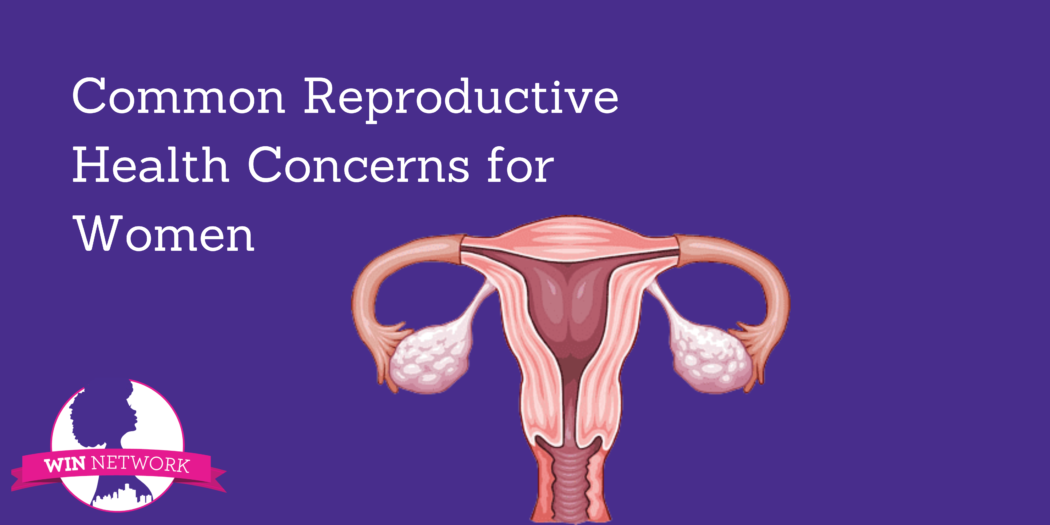Common Reproductive Health Concerns for Women

Reproductive health is the physical, mental, and social well-being of the male and female reproductive systems during all stages of life. The female reproductive system includes the ovaries and uterus. Taking care of this system is important for your personal health and well-being. It is especially important if you may want to become a mother, and for the health of future generations. Throughout your life, you will have sexual and reproductive health concerns. In this post, we’ll talk about 5 common reproductive health issues that you may deal with.
Amenorrhoea
Menstruation, more commonly known as periods, are a normal part of life after puberty. A common period problem can be missing your period. Amenorrhoea is the absence of a period. Common causes of missing your period other than pregnancy and menopause can be stress, extreme weight loss, excessive exercise, or certain reproductive disorders.
The three types of amenorrhoea are primary, secondary, and athletic amenorrhoea (1). Primary amenorrhoea is when a female has not had a first period by the age of 16 years (1). This is rare and can be due to genetics and lack of hormones needed to start getting periods (1). Secondary amenorrhoea is when periods stop for 3 months or more in a row (1). Poor nutrition, eating disorders, anxiety, depression, and birth control pills or intrauterine devices (IUDs) are known to cause secondary amenorrhoea (1). Athletic amenorrhoea is when someone exercises so much that they stop releasing the hormone called oestrogen, which can stop periods (1).
Amenorrhoea can cause infertility, early onset osteoporosis – a long-term disease that makes your bones more fragile – and early menopause (1). It is important to talk with your provider if you are having frequent missed periods. Your provider can give you treatment to help start your periods again. Treatments include hormone therapy, medication, nutritional advice, and counseling (1).
Endometriosis
Endometriosis is when tissue like the uterine lining grows somewhere else. It can grow on the ovaries, behind the uterus, on the bowels, or on the bladder (2). Endometriosis acts like your normal endometrial tissue would inside the uterus – it thickens, breaks down and bleeds with each period (3). However, because the tissue has nowhere to exit like it normally would inside the uterus, it becomes trapped (3). This can lead to pain during sex, infertility, and heavy periods (2). Symptoms of endometriosis include abdominal and pelvic pain. Some people have no symptoms until they try to get pregnant and discover fertility issues (2). If you think you have endometriosis, talk with your provider about screening and treatment.
Interstitial Cystitis
Interstitial cystitis is a long-lasting bladder condition causing pain or feeling uncomfortable in the lower stomach or pelvic region (2). When you have interstitial cystitis, the walls of your bladder (the organ that stores your urine) will become swollen, which can cause you to feel bloated in your lower stomach area (4). Common symptoms include needing to pee often and lower stomach pain (4). Interstitial cystitis unfortunately does not have a cure, but symptoms can be relieved with medications and therapy (4).
Polycystic Ovary Syndrome (PCOS)
PCOS is when more male hormones are made by the ovaries, causing cysts to form on the ovaries (2). PCOS can happen any time after your first period (5). Symptoms include infertility, more than usual hair growth, acne, on and off periods, and obesity (2). Speak with your healthcare provider if you are worried about your periods, have had sudden changes with your body such as new hair growth on the face and body, acne, and fast weight gain, or are having trouble getting pregnant.
Uterine Fibroids
Uterine fibroids are noncancerous growths in the uterus that happen during childbearing years (6). Uterine fibroids do not increase your risk for cancer and almost never become cancerous (6). Someone who does have uterine fibroids will experience abdominal pain or pain during sex (2). However, many women have uterine fibroids without knowing because there are usually no symptoms (6). If you think you have uterine fibroids, talk to your healthcare provider about having a pelvic exam or prenatal ultrasound.
Sources:
- https://www.betterhealth.vic.gov.au/health/conditionsandtreatments/menstruation-amenorrhoea
- https://www.cdc.gov/reproductivehealth/womensrh/healthconcerns.html#Cystitis
- https://www.mayoclinic.org/diseases-conditions/endometriosis/symptoms-causes/syc-20354656
- https://www.mayoclinic.org/diseases-conditions/interstitial-cystitis/symptoms-causes/syc-20354357

